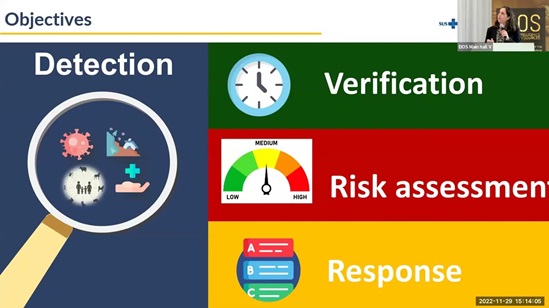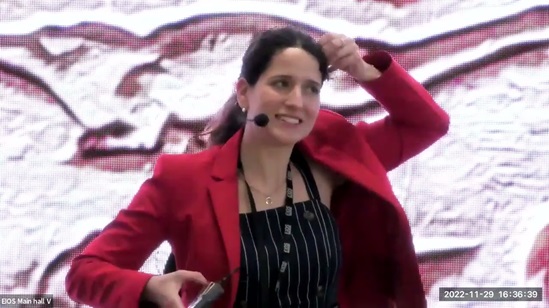
Day 1
Session 1: PHI decision maker (Panel discussion)
WHO Assistant-Director General Chikwe Ihekweazu and the panelists share their experiences coming out of the last three years of the COVID-19 pandemic and their advise for a better future. The discussion explores factors impacting the development and implementation of public-health related policies, including the roles and interaction of scientific, societal, and economic factors; citizen reactions to implemented policies and the challenges and opportunities these present; as well as the information and solution needs for creating robust decision-support mechanisms.
Panelists:
- Joy St. John, Executive Director, Caribbean Public Health Agency
- Mohammed Abdulaziz, Head of Division of Disease Control and Prevention, Africa Centres for Disease Control and Prevention
- Andrea Ammon, Director, European Centre for Disease Prevention and Control
- Rabindra Abeyasinghe, WHO Representative of Malaysia, Brunei, and Singapore, World Health Organization
Session 2: Let's talk about trust (Presentation)
Professor Stephen David Reicher analyses various interactions and effects of trust (or the lack thereof) between the government and the public, and specifically highlighted the role of trust for an effective response to the COVID-19 pandemic. He demonstrated how trust was linked to an inclusive sense of shared identity or community and provided illustrations of how this sense of community, and hence trust, can be built or else undermined.
Session 2: Let's talk about trust (Panel discussion)
WHO Regional Emergency Director for the Eastern Mediterranean Richard Brennan and the panelists discuss the need for robust governance in health and shared their thoughts on how political leaders on COVID-19 strategies were impacted by specialist experts or those with an established relationship with government bodies, reflecting a default governance mode. The panelists also discuss how populations, communities and civil society were largely left out, although dialogue initiatives are crucial to building trust and policy adherence. At the end, the panelists share their thoughts on how to foster health democracy and bring people’s voice into emergency responses and health policies.
Panelists:
- Boniface Dulani, Director of Surveys, Afrobarometer
- Stephen David Reicher, Professor of Psychology at the University of St. Andrews,
- Zubaida Haque, Former CEO of The Equality Trust /Member of Independent SAGE
Day 2
Session 3: Citizen Engagement (Presentations)
In this session, John Sung Jin Lee, Strategic Advisor to the WHO’s community centered Epidemic and Pandemic Information Platform HIVE, together with a number of experts on engaging and including citizens, takes us on a journey through different citizen engagement initiatives in the lead-up to further discussions on the role of the public as part of the public health intelligence process.
- Sarah Hess, the Technical Officer on Partnerships and Strategy at the World Health Organization, highlights how WHO is convening large global networks of key multisectoral stakeholders to share trustworthy information and best practices, co-create evidence-based and context-specific solutions, and collaborate for health emergency preparedness, response, and resilience.
- Keng Susumpow, Managing Director at the Opendream, highlights how we should use the power of human’s “social listening” and combine it with usable digital technology that suits the area. In his presentation, he shares his experience with a community disease surveillance project in Thailand.
- Onicio Leal Neto, Digital Innovation Specialist at the Ending Pandemics, presents the Global Flu View which is a digital ecosystem of global influenza-like illness activity based on citizens' self-reported data from several programs around the world. He highlights how individuals' real-time symptoms reporting can complement traditional influenza tracking while providing useful information directly to the public.
- Nomita Divi, Executive Director of the Ending Pandemics, presents EpiCore- a virtual community of health professionals that supports the rapid verification of reports of potential health threats. Nomita highlights how the global demand for data to improve disease prevention and control continues to grow and how systems continue to emerge and evolve as a consequence.
- Shaimaa Abukamer, Event Based Surveillance Coordinator at the Department of Epidemiology and Surveillance of the Ministry of Health and Population, Egypt, presents on participatory surveillance in Egypt and demonstrates how the national surveillance system works at the subnational level. She further speaks about different phases of implementing event-based surveillance (EBS) in the country and gives an outlook on future steps for surveillance in Egypt.
Session 3: Citizen Engagement (Discussion)
In this discussion, John Sung Jin Lee, Strategic Advisor to the WHO’s community centered Epidemic and Pandemic Information Platform HIVE, reflects with Eloise Todd, Executive Director and Co-founder of the Pandemic Action Network, on the key highlights discussed by participants during the citizen engagement workshop held earlier. They examine general observations, advantages, risks and mechanisms of citizen engagement for generating public health insights for action.
Session 4: Mandated authorities - Part 1 International (Panel discussion)
Leo Wolansky, Director of Data Strategy and Products at The Rockefeller Foundation, and the panelists discuss how trust, citizen engagement, policy and decision making applies to their roles and their organizations, in the context of public health intelligence. The panelists highlight the role of infodemic management during the COVID-19 pandemic along with how countries can integrate misinformation and rumors into their surveillance systems – especially during pandemics and epidemics.
Panelists:
- Tim Nguyen, Unit Head of the High Impact Events Preparedness Impact Events Preparedness, World Health Organization
- Paolo Tizzani, Veterinary Epidemiologist, World Organisation for Animal Health
Session 4: Mandated authorities - Part 2 Regional (Panel Discussion)
Together with her panelists, Joy St. John, Executive Director of the Caribbean Public Health Agency (CARPHA), discusses the role of their respective organizations and their experiences in citizen engagement, trust building, decision- and policy making when it comes to public health intelligence. The panelists highlight ways to optimize the value of the regional organizations they represent and how they fit into the global public health architecture, specifically in the area of public health intelligence.
Panelists:
- Gianfranco Spiteri, Principal Expert at the Epidemic Intelligence, European Centre for Disease Prevention and Control
- Kyeng Mercy Tetuh, Event Based Surveillance Coordinator, Africa Centres for Disease Control and Prevention
- Naif Alharbi, Director at the Public Health Emergency, Gulf Center for Disease Control and Prevention
- Amarnath Babu, Medical Officer, Epidemiologist, WHO Regional Office for South-East Asia
Session 4: Mandated authorities - Part 3 National (Panel discussion)
Pierre Nabeth, WHO Programme Area Manager for the Eastern Mediterranean, and the panelists representing a range of national health organizations, discuss prioritization and challenges with implementing public health intelligence in their countries. They further explore changes that occurred at national authority level during the COVID-19 pandemic along with different community contributions to surveillance activities.
Panelists:
- Daniel Faktaufon, Senior Medical Officer, Ministry of Health and Medical Services, Fiji
- Sandrine Uwamahoro, Diseases Monitoring Officer, Rwanda Biomedical Centre
- Nada Ghosn, Head of the Epidemiological Surveillance Program, Ministry of Public Health, Lebanon
- Andreas Jansen, Head of the Federal Information Centre for International Health Protection, Robert Koch Institute, Germany
- Bhola Prasad Roka, Statistics Officer at the Epidemiology and Disease Control Division, Ministry of Health and Population, Nepal
- Albert Ty, Deputy Director at the Epidemiology and Disease Control Division, Ministry of Health, Singapore
Day 3
Session 5: Connecting information in a connected world – Part 2: Better Data
- Martin Hofmann, Apitius, Head of Department of Bioinformatics at the Fraunhofer Society, presents the COPERIMOplus project, which aims to generate complete data- and knowledge landscapes for COVID-19; including a dedicated ontology, integrated (mapped) data and a searchable catalogue of COVID-19 study data. He describes the main strategy and outcomes of the COPERIMOplus project and discusses perspectives for global public health. Concluding, shares the response of the Fraunhofer Society to the COVID-19 pandemic.
- Krzysztof Janowicz, professor at the Universities of Vienna and California, presents the Know Where Graph (KWG) Project. KWG aims to provide area briefings within seconds for any region on the planet to answer questions such as "What is here?", "What happened here before?", "Who knows more?", and "How does it compare to other regions or previous events?".
Session 5: Connecting Information in a connected world - Part 3: Insights and Analytics
- David Buckeridge, professor at McGill University, presents examples of information that can influence aberration detection within and across regions and demonstrates potential approaches for connecting different types of information to improve aberration detection.
- Ana Bento, Science Director at The Rockefeller Foundation, presents how the Foundation tracks local and global patterns of emerging SARS-CoV variants. She also highlights the importance of data and how it can provide a clear image for the variant situation in countries.
- Brian Doherty, Project Manager at the Joint Research Centre of the European Commission, presents new and upcoming features of the EIOS system, with a focus on artificial intelligence (AI) approaches.
Session 6: Working together for stronger public health intelligence – (Presentation 2)
Agnes Molnar, acting Head of Unit for the European Commission’s Health Emergency and Preparedness and Response Authority (HERA), highlights the need for improved collaborations across different sectors, domains and jurisdictions. She provides an overview of HERA’s intelligence gathering and threat assessment, aimed at strengthening Europe’s ability to prevent, detect, and rapidly respond to cross-border health emergencies, by ensuring the availability of and access to key medical countermeasures.
Session 6: Working together for stronger public health intelligence (Presentations 3-5)
- Julia Fitzner, Epidemiologist at the World Health Organization, presents the “Collaboratory,” a digital, interactive environment that is currently being set up by the new WHO Hub for Pandemic and Epidemic Intelligence. As a “Laboratory for Collaborative Intelligence”, it aims to connect different subject matter experts and the epidemic and pandemic intelligence community to communicate, cultivate ideas together, and rapidly generate, improve, and share actionable insights to respond to public health risks.
- Samuel Mbuthia, who leads the Open-Source Programme Office at the new WHO Hub for Pandemic and Epidemic Intelligence in Berlin, explains what “Open Source” is and which characteristics it possesses.
- Florence Tanguay from the Public Health Agency of Canada talks about the Global Public Health Intelligence Network (GPHIN), the country’s early-warning, event-based surveillance system, which she has been managing since 2020. GPHIN relies on publicly available information sources in multiple languages and Tanguay particularly highlights the benefits of collaboration.
Session 6: Working together for stronger public health intelligence (Panel Discussion)
In this session, chaired by David Buckeridge who is the Chief Digital Health Officer at the McGill University Health Center, panelists highlight the need for improved collaboration across different sectors, domains and jurisdictions. They demonstrate different mechanisms that can help bridge various collaborations and initiatives and described current efforts of WHO to support the design, development and governance of resulting public health solutions as global public goods.
Panelists:
- Ibrahim Mahgoub Program Director, Epiverse
- Agnes Molnar, Acting Head of Unit European Commission Health Emergency Preparedness and Response Authority
- Julia Fitzner, Unit Head, Insights and Analytics, World Health Organization
- Samuel Mbuthia, Open-Source Programme Office Lead, World Health Organization
- Florence Tanguay, GPHIN Manager, Public Health Agency of Canada
Session 7: EIOS Implementation - Challenges and Opportunities (Presentations)
In this session, representatives from the global EIOS Community of Practice shared their experience with EIOS implementation in their respective countries, organizations, or networks. They highlighted different ways the EIOS system is being employed for PHI activities and shared their success stories.
- Janaina Sallas, General Coordinator of the Center for Strategic Information in Health Surveillance at the Ministry of Health in Brazil, shares the experience of Brazil in Implementing the EIOS system. The EIOS Brazil community is currently comprised of more than 400 users, managing more than 40 boards on the system. Janaina Sallas highlights the benefits of applying EIOS, including the possibility to examine different types of official and unofficial sources, as well as increases in early warning for events and the number of alerts detected.
- Haja Fatmata Bangura, Event-Based Surveillance Analyst (Jhpiego) at the Ministry of Health and Sanitation in Sierra Leone walks us through the experience of EBS and EIOS implementation in Sierra Leone, while highlighting the special mentorship approach that has been piloted between Sierra Leone and the Nigeria CDC.
- Hanan Abdulghafoor, Head of the Surveillance Section, Communicable Diseases Control Center Directorate of Public Health at the Ministry of Health in Iraq, talks about EIOS implementation in the country.
- Evangelia Petrisli, Medical Doctor from the Microbiology Unit IRCCS Azienda Ospedaliero- Universitaria di Bologna in Italy, talks about adapting and employing the EIOS system to support the NOTIFY Project, as part of the MPHO [Medical Products from Human Origin] Safety Network. NOTIFY aims to provide professionals with relevant information helpful for determining the suitability of a potential MPHO donors, to draft common guidelines supporting the implementation of effective vigilance and surveillance in the field of MPHO, and to provide practical support to countries that are developing vigilance systems for MPHO.
Session 7: EIOS Implementation - Challenges and Opportunities (Q&A session)
In this final session of the 2022 EIOS GTM, the EIOS Core Team (ECT) gives the floor to participants to ask them any question related to GTM sessions, their work, and future ambitions of the EIOS initiative.

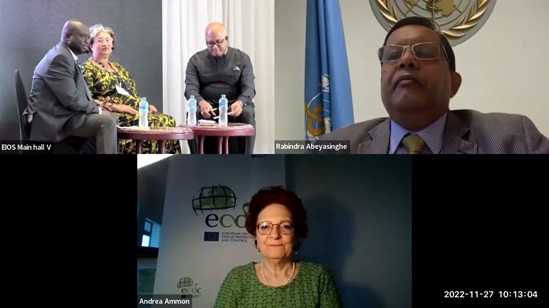
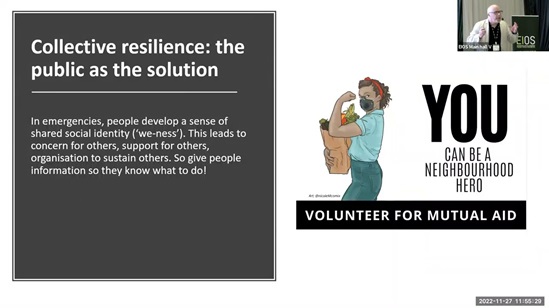
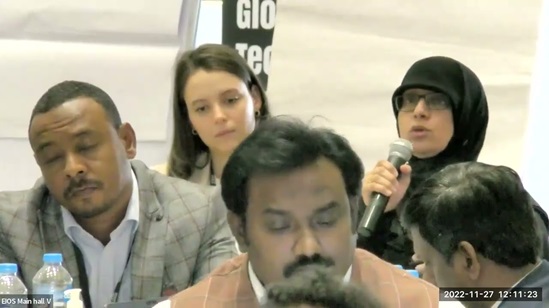

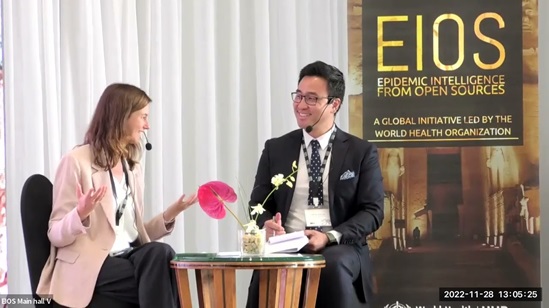
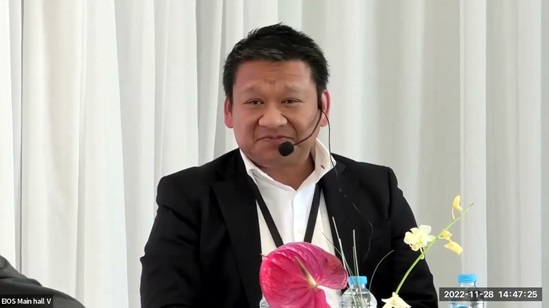
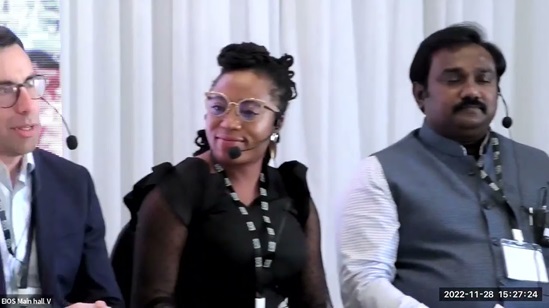
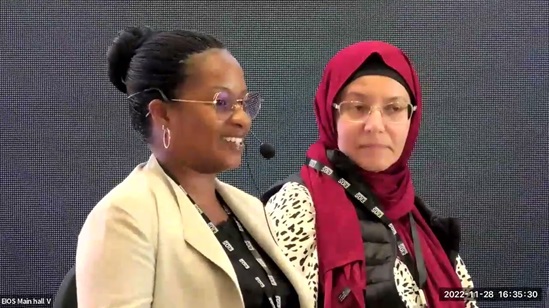
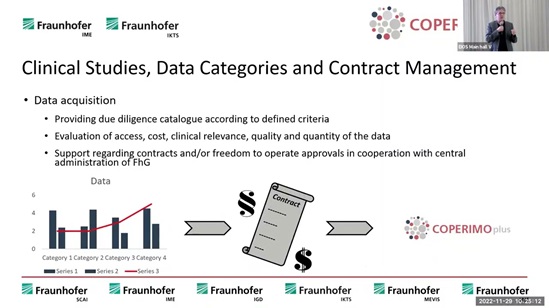
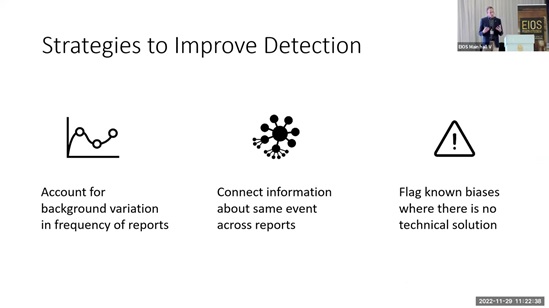
.tmb-549v.jpg?sfvrsn=44b81fec_1)
.tmb-549v.jpg?sfvrsn=3672e16_1)
.tmb-549v.jpg?sfvrsn=fff2c9e1_1)
